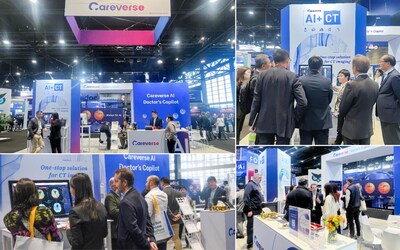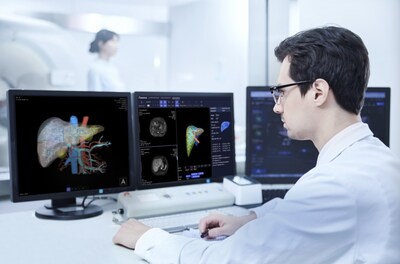RSNA 2024 Spotlight: Careverse Leads the New Trend in Medical AI
PR Newswire
CHICAGO, Dec. 12, 2024
CHICAGO, Dec. 12, 2024 /PRNewswire/ -- From December 1st to 5th, 2024, RSNA 2024—the largest and most future-oriented top medical event in the global radiology community, was held in Chicago. At this conference, Careverse officially made its debut, exhibiting in the AI Showcase area, sharing its innovative achievements in multimodal imaging AI and large language models with medical experts and scientists from around the world.
The theme of the 2024 RSNA Annual Meeting is "Building Intelligent Connections", denoting the important role of artificial intelligence in empowering radiologists to face the future. This is exactly what Careverse is committed to doing: to empower a new era of smart healthcare by creating an AI-powered Digital Doctor which assists human doctors to deliver much more efficient, accurate, consistent and accessible patient care.
Careverse has an international product R & D and marketing team, cooperating with top hospitals and research institutions around the world. At present, it has launched more than 40 AI-powered clinical applications and holds numerous intellectual property rights globally. Careverse's products cover various modalities of medical imaging, such as CT, MRI, ultrasound, X-rays and mammography, etc., using a series of AI product combinations to reshape the entire workflow of disease management—from screening and diagnosis to treatment decision-making and follow-up care. This comprehensive approach significantly improve the efficiency and quality of the whole-cycle management of the most prevalent and life-threatening diseases in the world, including cardiovascular and neurovascular diseases, lung cancer, liver cancer, breast cancer, and numerous others.
"Digital Heart" as a representative of multimodal AI changes traditional workflow
The heart is one of the most complex organs in the human body, constantly beating, making imaging quite complex. Therefore, accurate diagnosis of heart diseases requires doctors to have rich clinical experience and profound professional knowledge accumulation.
Careverse's "Digital Heart" product family takes the lead in applying AI to the automatic analysis of complex imaging data, aiming to accurately measure cardiac anatomy and various lesions, and present these key indicators in an intuitive and accurate manner preferred by doctors, assisting in generating diagnostic suggestions and pre-reports. This significantly reduces the manual workload of radiologists, enabling them to dedicate more time to accurate diagnoses and seamless collaboration with other clinical departments.
In the screening process, Careverse enables fully automated calculation of non-gated coronary artery calcium scoring, quantifying the calcification of the four branches of the coronary artery (left main trunk, left circumflex, left anterior descending, right coronary artery) based on a single chest CT scan image data analysis, realizing the risk screening of coronary heart disease in asymptomatic populations.
In the precise diagnosis process, Careverse's Coronary CTA product revolutionizes the traditional radiology workflow by enabling fully automated vessel segmentation and image reconstruction. This innovation eliminates the need for time-consuming post-processing and multi-step handoffs between post-processing doctors and diagnostic doctors, allowing for rapid, accurate assessments with the entire process completed in just 1 minute. As a result, doctor efficiency is significantly improved, and the patient experience is enhanced. Careverse's unique coronary AI model and algorithm also deliver superior image reconstruction, handling complex clinical scenarios like bypasses, stents, myocardial bridges, and ectopic origins with ease.
While completing the morphological analysis of the coronary artery, doctors can also use Careverse's CT-FFR product to complete functional analysis, thereby further improving the accuracy of the diagnosis. Compared with the existing FFR analysis tools on the market, Careverse's fully automated CT-FFR product can generate the result directly within the hospital, with a calculation time three times shorter than semi-automatic products, and no manual intervention is required, which can be used as an objective and convenient tool for functional assessment of coronary artery stenosis.
Careverse's "Digital Heart" product family also includes intelligent analysis of coronary vulnerable plaques, peri-coronary fat, and CT heart function in CT modality, and coronary MRA AI and CMR AI products in MR modality. It can provide AI support for the diagnosis and treatment of cardiovascular disease patients at different stages.
In addition to "Digital Heart," Careverse has also launched a series of AI products such as "Digital Brain", "Digital Chest", "Digital Abdomen", and "Digital Breast", covering imaging examinations of whole-body blood vessels, bones, and other important organs related to tumors in CT/MR and other scenarios. Integrated into a seamless Scan-to-Report process, they support disease-centered screening, diagnosis, treatment, and research. Clinically validated across multiple centers, these products deliver accuracy on par with expert human doctors.
Careverse has also integrated the AI system with ultrasound equipment, introducing the world's first "Turing Brain" and "Turing AR" hardware technologies. These innovations enable real-time analysis of ultrasound video streams, displaying AI-enhanced lesion details directly on the original ultrasound screen. This advancement assists doctors during scanning and diagnosis, significantly improving the detection and diagnostic processes for conditions in areas such as breast, thyroid, carotid artery, and obstetrics.
Dr. Josep Munuera, Director of the Diagnostic Imaging Service at Hospital Sant Pau in Spain, is at the forefront of AI research in advanced medical imaging. Reflecting on his decade-long experience attending the RSNA, Dr. Munuera noted a significant surge in the number of AI companies and the diversity of AI-driven applications in the field.
"The medical imaging industry is undergoing a transformation — from machines that generate imaging data to software that analyzes it, driven by the rapid development of artificial intelligence," says Dr. Munuera.
Dr. Munuera highlighted his appreciation for the comprehensive, full-body coverage offered by Careverse AI's solution. Unlike the need to rely on multiple vendors to target different anatomical areas, Careverse provides a single, unified platform. This approach is not only more convenient and easier to apply but also enables the accumulation of invaluable resources for physicians seeking a holistic view of patient health.
"One of the key areas where AI is making a significant impact is in emergency care, such as acute chest pain" emphasized Dr. Munuera. He noted that Sant Pau is currently facing a shortage of radiologists to handle chest pain cases. Careverse's AI solution, which supports coronary CTA, CT-FFR, pulmonary embolism, and aortic dissection diagnosis, serves as a "Co-pilot" for radiologists. This solution enhances efficiency, optimizes capacity, and enables faster, more accurate diagnoses in high-pressure emergency scenarios.
Multimodal large language models lead future healthcare to a higher level
Due to its deep accumulation in the medical imaging industry, Careverse naturally has a first-mover advantage in the era of medical large models, launching industry-leading AIGC solutions that can not only better assist radiologists but also bring great help to doctors in all departments of the hospital, which has been used in hundreds of hospitals.
For example, when a liver disease patient comes to the imaging department for examination, Careverse's AIGC solution can act as a full-process digital assistant for doctors—
- Post-processing assistant: The liver's own anatomical structure is complex, and surgical history, tumor compression, or cirrhosis can cause variations in the liver substance and pipeline system, making precise segmentation of the liver and lesions difficult. Now, no matter which imaging examination the patient undergoes, such as X-ray, CT, MR, US, pathology, etc., doctors can use Careverse's leading medical imaging large language model to automatically segment, detect, and classify image data, greatly shortening image post-processing time.
- Diagnosis assistant: Due to the complexity and multifunctionality of the liver, liver diseases also show a wide variety of complex and diverse manifestations, posing challenges to accurate diagnosis. Careverse's large language model can integrate and compare different modalities of image data from the same patient, forming an unprecedented basis for image diagnosis. In addition, it has learned a large amount of medical literature and clinical guidelines, can output clinical reasoning analysis, thereby assisting doctors in differential diagnosis, can improve the diagnostic accuracy rate of difficult multiple diseases, and help doctors diagnose efficiency by 1 time.
- Modeling assistant: In assisting the treatment decision of liver disease, Careverse's large language model has excellent 3D image generation capabilities. It can produce movie-quality renderings of human organ structures, allowing for a detailed exploration of the course and interrelationships between interlobular vessels and bile ducts, and provide accurate basis for doctors to view organ lesions more intuitively and plan surgeries more effectively.
- Reporting assistant: During the examination and consultation process, Careverse's large language model can interpret existing reports, extract key information, and automatically generate reports in real-time according to the examination and diagnosis results, while checking the doctor's typos, assisting doctors in standardizing medical record writing.
- Q&A assistant: The AI Agent derived from Careverse's large language model also brings a new way of interaction for doctors and patients, which can conduct pre-consultation and give rehabilitation advice through dialogue. This helps to form a comprehensive patient health record, providing strong support for better prevention, accurate diagnosis, treatment decision-making, rehabilitation, and daily health monitoring.
The combination of healthcare and AI is becoming increasingly close. The well-known consulting institution Fortune Business Insights predicts that the global healthcare AI market size will grow from $27.69 billion in 2024 to $490.96 billion in 2032, with a compound annual growth rate of 43.2%.
As of now, Careverse has obtained 4 MDR CE markings, 2 FDA 510(K) approvals and 1 PMDA Certificate. With field-tested reliability and performance, the company's products have been embedded into the radiology workflow. Careverse has collaborated with top researching institutions in Japan, South East Asia, US and Europe, and their products are deployed in the hospitals in Asia, Europe, Middle East and US. Facing the vast market, Careverse will continue to innovate with multimodal medical large language model technology, build an open cooperative ecosystem, promote the deep integration and application of AI technology in the healthcare industry, and lead the new trend of intelligent healthcare services.
![]() View original content to download multimedia:https://www.prnewswire.com/news-releases/rsna-2024-spotlight-careverse-leads-the-new-trend-in-medical-ai-302329932.html
View original content to download multimedia:https://www.prnewswire.com/news-releases/rsna-2024-spotlight-careverse-leads-the-new-trend-in-medical-ai-302329932.html
SOURCE Careverse





